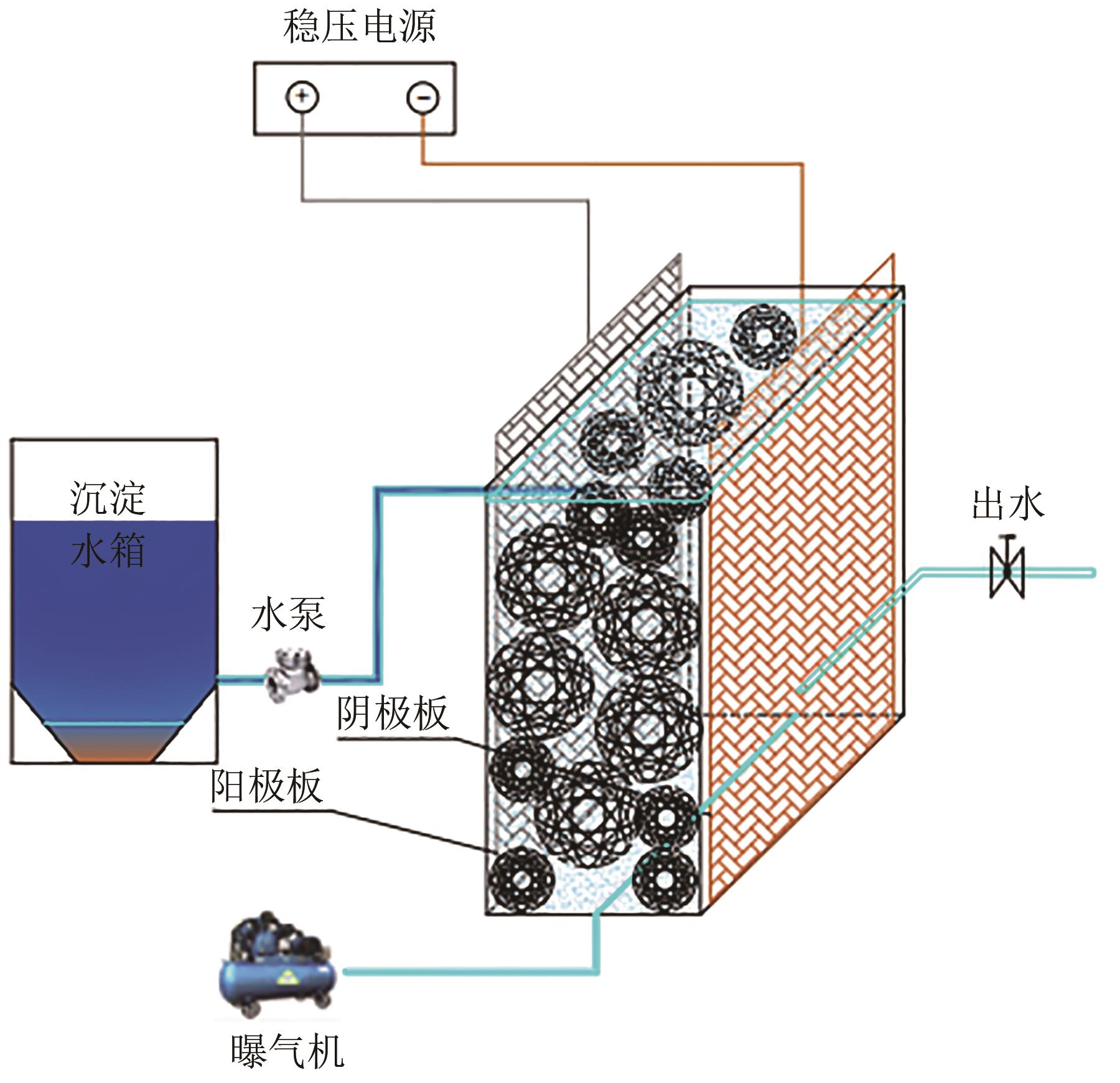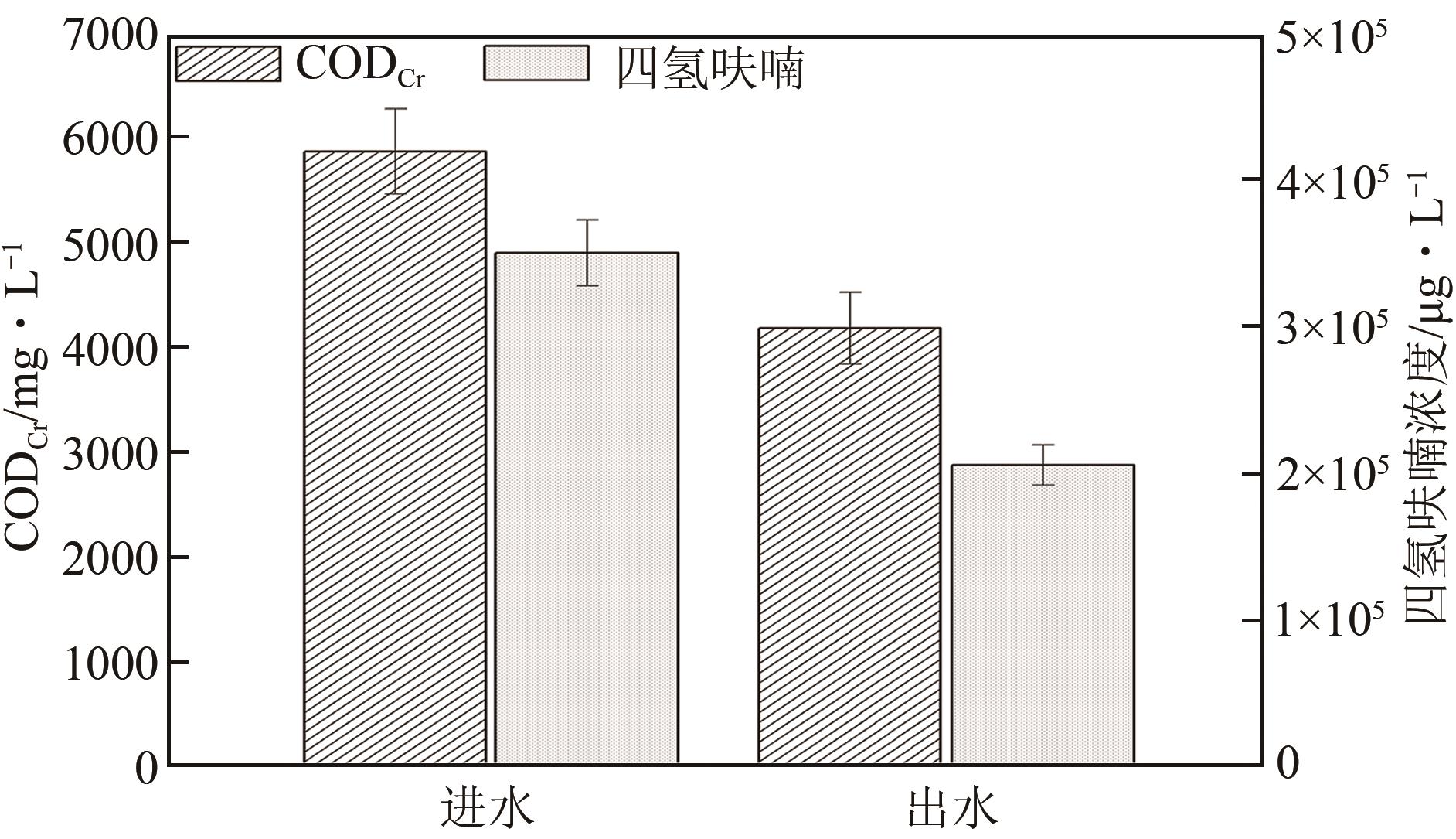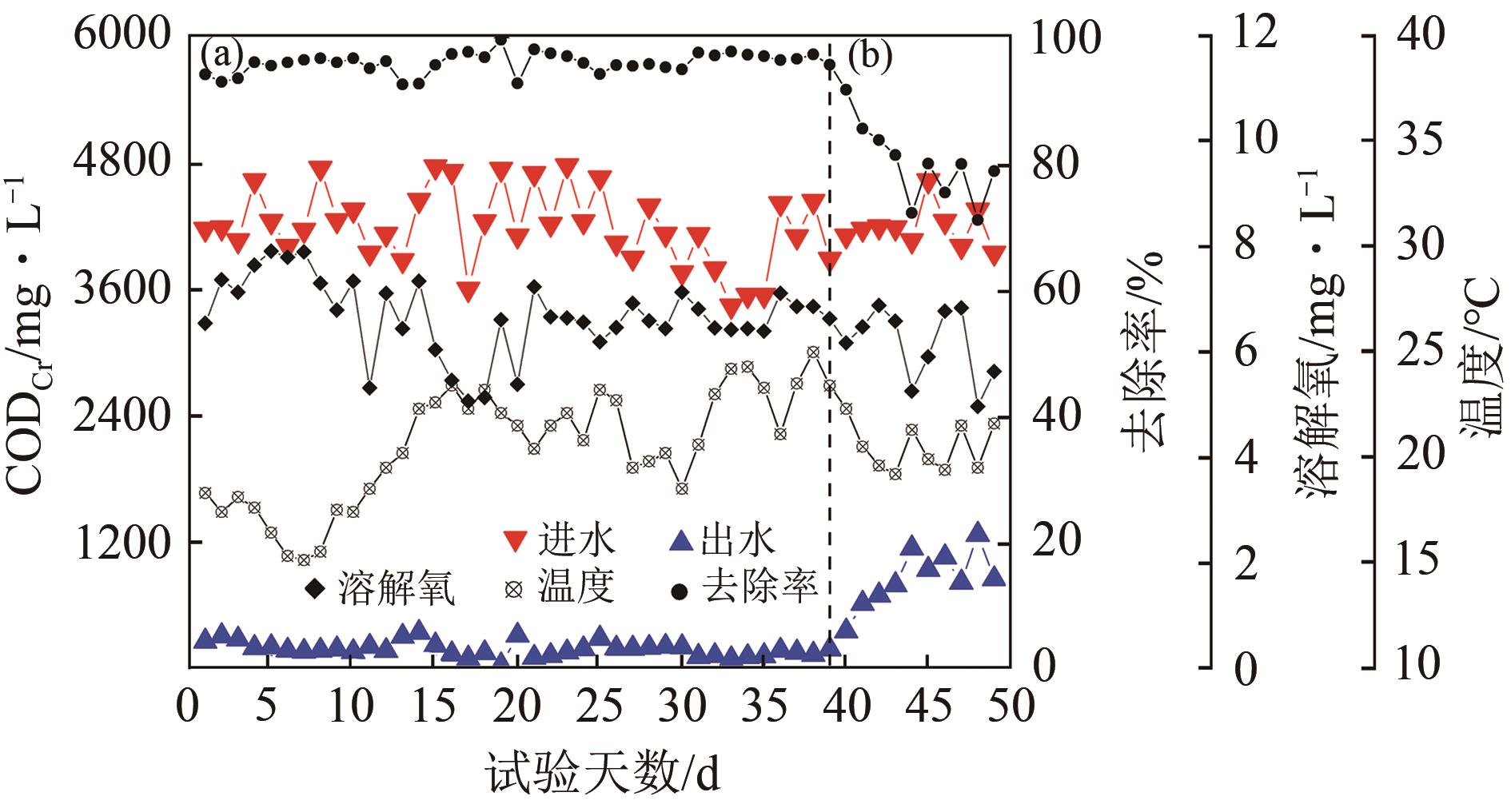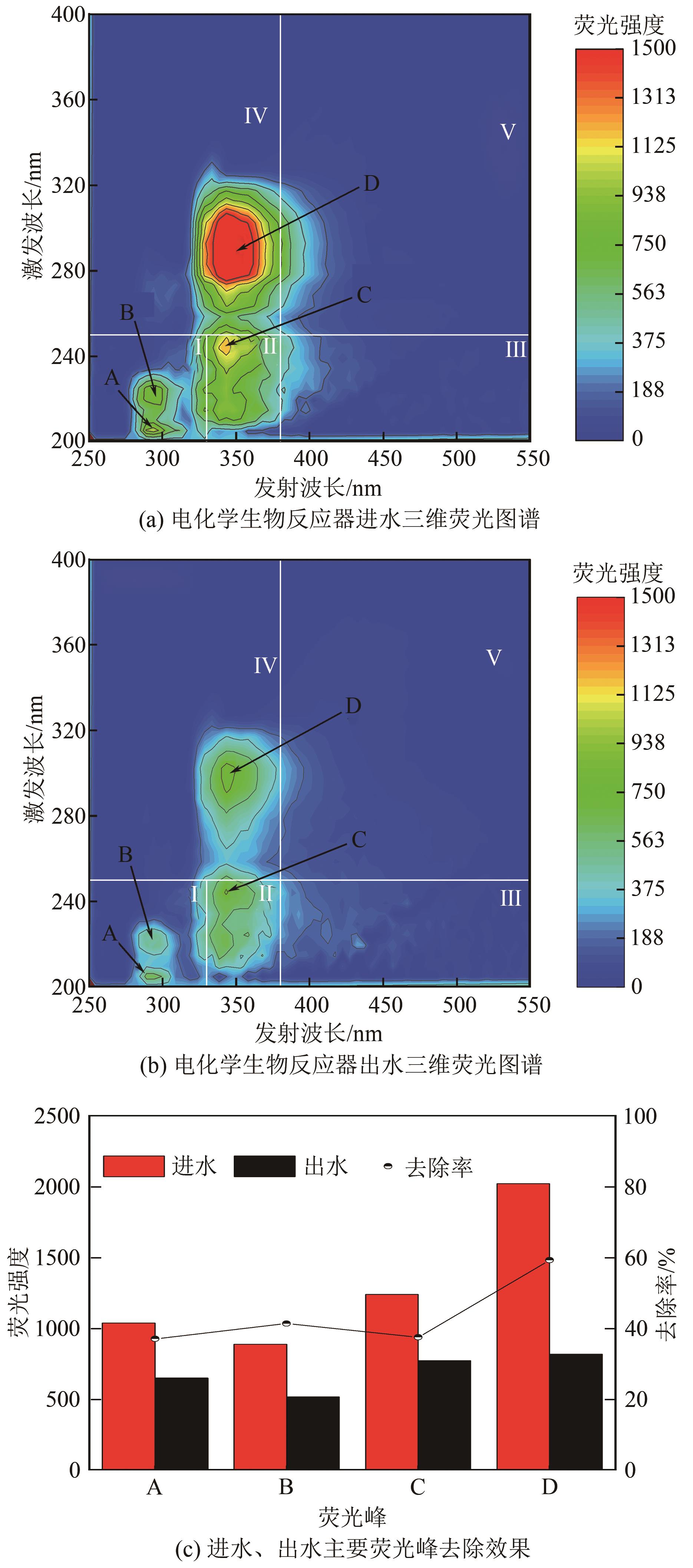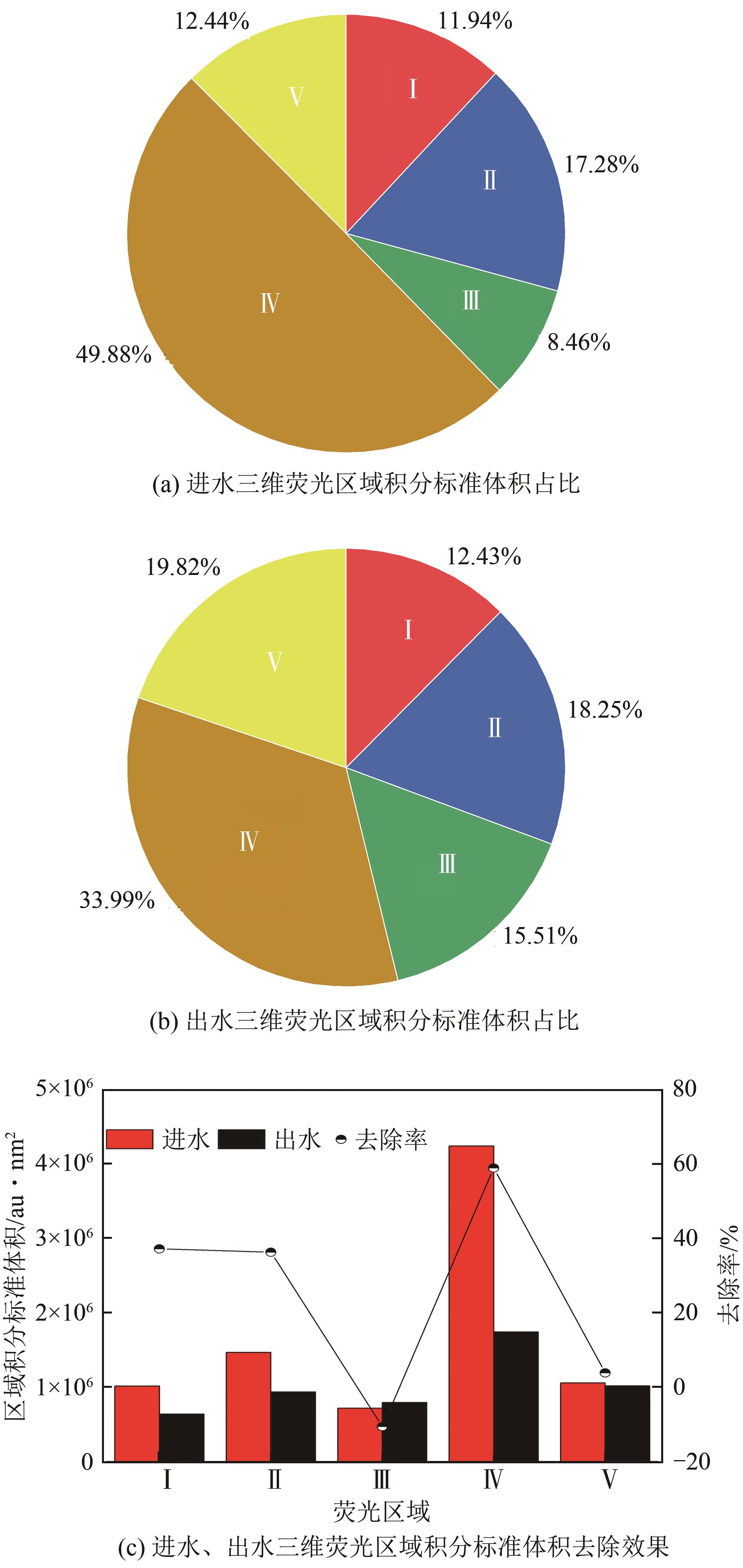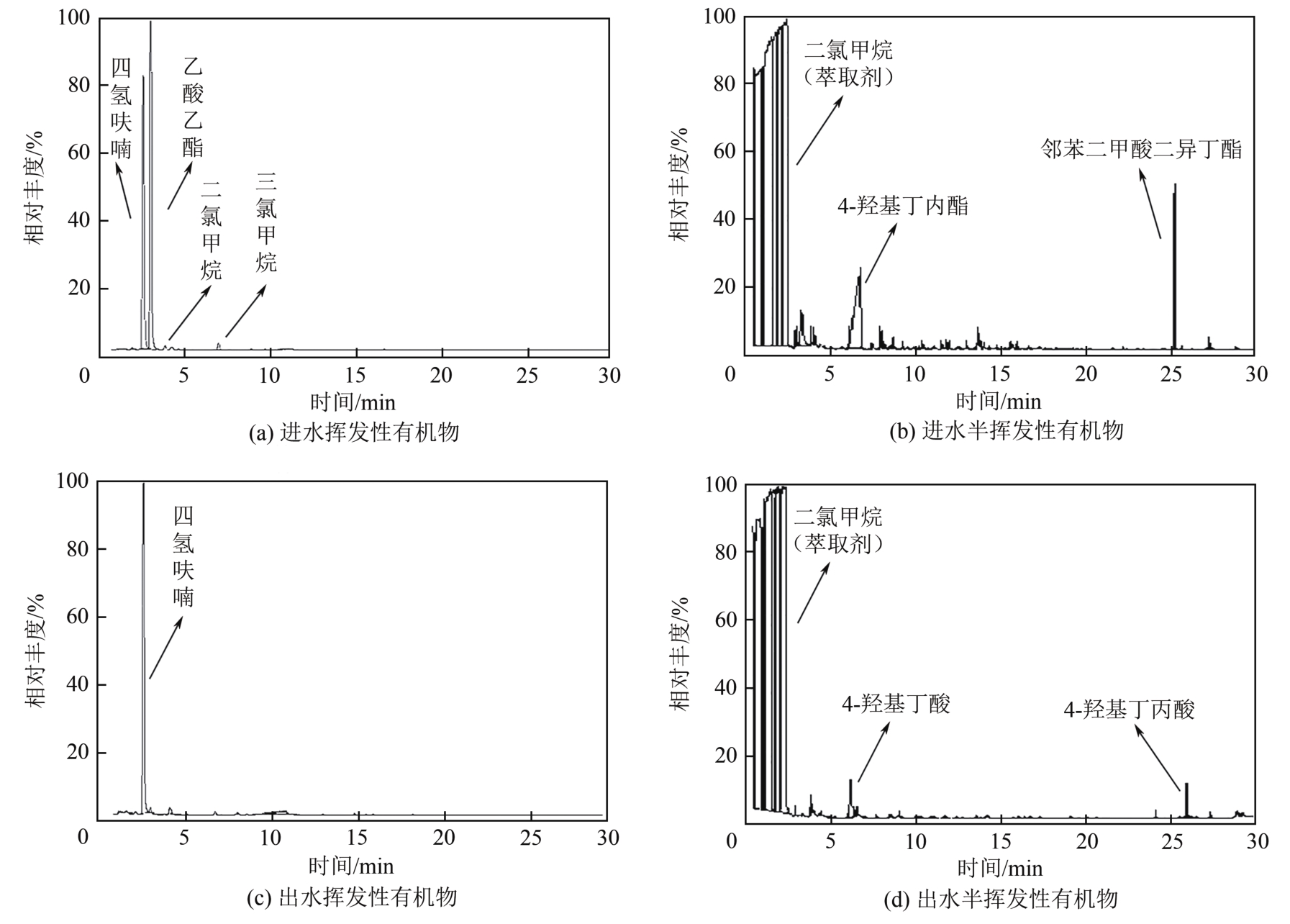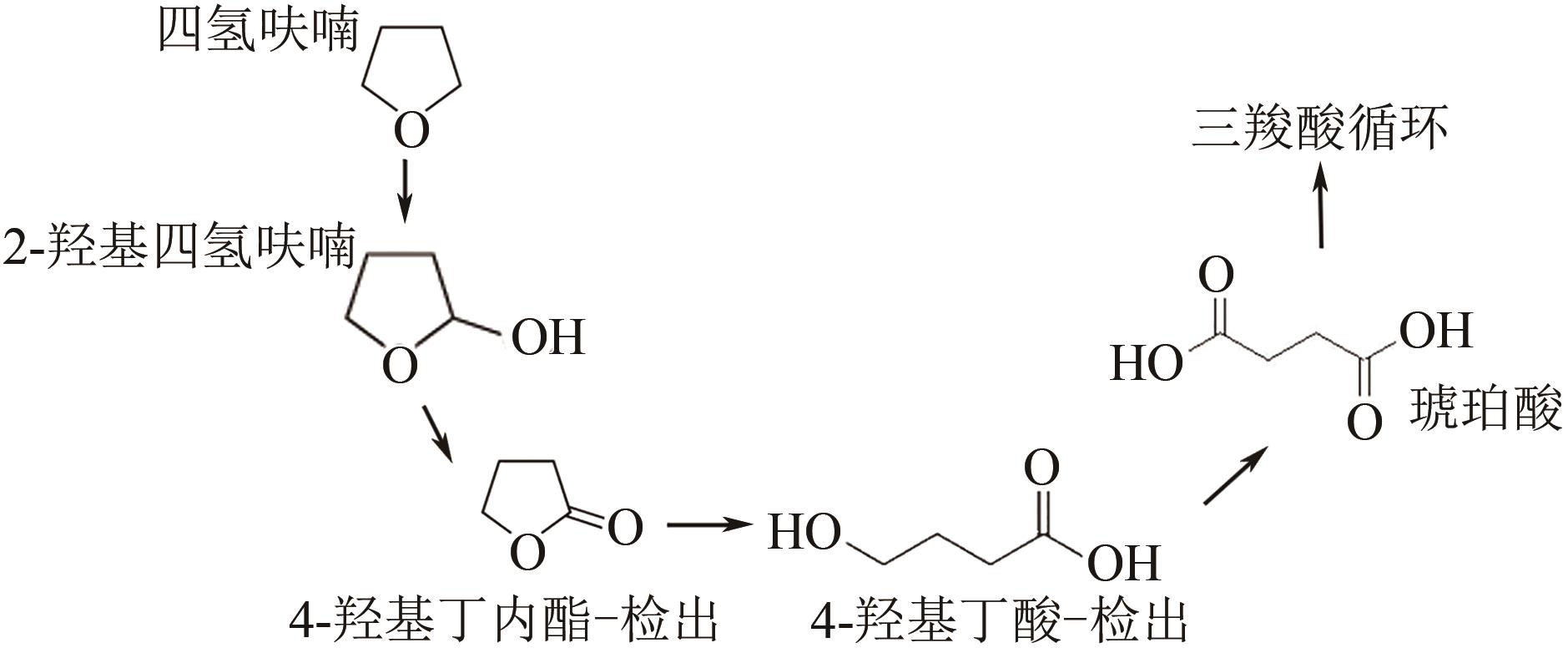Chemical Industry and Engineering Progress ›› 2022, Vol. 41 ›› Issue (9): 5055-5064.DOI: 10.16085/j.issn.1000-6613.2021-2421
• Resources and environmental engineering • Previous Articles Next Articles
Degradation of refractory organics in the pharmaceutical wastewater by bioelectrochemical system
XU Yabing1,2( ), WANG Baoshan1,2(
), WANG Baoshan1,2( ), WANG Guangzong1,2, ZHANG Yang1,2
), WANG Guangzong1,2, ZHANG Yang1,2
- 1.School of Environmental and Municipal Engineering, Lanzhou Jiaotong University, Lanzhou 730070, Gansu, China
2.Key Laboratory of Yellow River Water Environment in Gansu Province, Lanzhou 730070, Gansu, China
-
Received:2021-11-25Revised:2022-03-24Online:2022-09-27Published:2022-09-25 -
Contact:WANG Baoshan
生物电化学系统对制药废水中难生化有机物的降解
许亚兵1,2( ), 王宝山1,2(
), 王宝山1,2( ), 汪光宗1,2, 张洋1,2
), 汪光宗1,2, 张洋1,2
- 1.兰州交通大学环境与市政工程学院,甘肃 兰州 730070
2.甘肃省黄河水环境重点实验室,甘肃 兰州 730070
-
通讯作者:王宝山 -
作者简介:许亚兵(1995—),男,硕士研究生,研究方向为工业废水处理。E-mail:1004153747@qq.com。 -
基金资助:国家自然科学基金(51368029);甘肃省重点研发计划(17YF1FA114);甘肃省2020年度重点人才项目(2020RCXM082)
CLC Number:
Cite this article
XU Yabing, WANG Baoshan, WANG Guangzong, ZHANG Yang. Degradation of refractory organics in the pharmaceutical wastewater by bioelectrochemical system[J]. Chemical Industry and Engineering Progress, 2022, 41(9): 5055-5064.
许亚兵, 王宝山, 汪光宗, 张洋. 生物电化学系统对制药废水中难生化有机物的降解[J]. 化工进展, 2022, 41(9): 5055-5064.
share this article
Add to citation manager EndNote|Ris|BibTeX
URL: https://hgjz.cip.com.cn/EN/10.16085/j.issn.1000-6613.2021-2421
| 荧光区域 | λEx/nm | λEm/nm | 物质类型 |
|---|---|---|---|
| Ⅰ | 200~250 | 250~330 | 酪氨酸类蛋白质 |
| Ⅱ | 200~250 | 330~380 | 色氨酸类蛋白质 |
| Ⅲ | 200~250 | 380~550 | 富里酸类腐殖质 |
| Ⅳ | 250~400 | 280~380 | 含苯环蛋白质、溶解性微生物代谢产物 |
| Ⅴ | 250~400 | 380~550 | 腐植酸类腐殖质 |
| 荧光区域 | λEx/nm | λEm/nm | 物质类型 |
|---|---|---|---|
| Ⅰ | 200~250 | 250~330 | 酪氨酸类蛋白质 |
| Ⅱ | 200~250 | 330~380 | 色氨酸类蛋白质 |
| Ⅲ | 200~250 | 380~550 | 富里酸类腐殖质 |
| Ⅳ | 250~400 | 280~380 | 含苯环蛋白质、溶解性微生物代谢产物 |
| Ⅴ | 250~400 | 380~550 | 腐植酸类腐殖质 |
| 样品 | 四氢呋喃浓度/µg·L-1 | 乙酸乙酯浓度/µg·L-1 | 二氯甲烷浓度/µg·L-1 | 三氯甲烷浓度/µg·L-1 | CODCr浓度/mg·L-1 |
|---|---|---|---|---|---|
| 进水 | 201847 | 205915 | 521.5 | 474.8 | 4547.9 |
| 出水 | 4744 | 18.5 | 4.9 | 13.8 | 84.4 |
| 去除率 | 97.65% | 99.99% | 99.06% | 97.09% | 98.14% |
| 样品 | 四氢呋喃浓度/µg·L-1 | 乙酸乙酯浓度/µg·L-1 | 二氯甲烷浓度/µg·L-1 | 三氯甲烷浓度/µg·L-1 | CODCr浓度/mg·L-1 |
|---|---|---|---|---|---|
| 进水 | 201847 | 205915 | 521.5 | 474.8 | 4547.9 |
| 出水 | 4744 | 18.5 | 4.9 | 13.8 | 84.4 |
| 去除率 | 97.65% | 99.99% | 99.06% | 97.09% | 98.14% |
| 1 | SHAH Ananya, SHAH Manan. Characterisation and bioremediation of wastewater: a review exploring bioremediation as a sustainable technique for pharmaceutical wastewater[J]. Groundwater for Sustainable Development, 2020, 11: 100383. |
| 2 | SHI Yufei, LI Shengnan, WANG Liye, et al. Compositional characteristics of dissolved organic matter in pharmaceutical wastewater effluent during ozonation[J]. The Science of the Total Environment, 2021, 778: 146278. |
| 3 | JOSE Jerin, PHILIP Ligy. Continuous flow pulsed power plasma reactor for the treatment of aqueous solution containing volatile organic compounds and real pharmaceutical wastewater[J]. Journal of Environmental Management, 2021, 286: 112202. |
| 4 | PRIYA V S, PHILIP Ligy. Treatment of volatile organic compounds in pharmaceutical wastewater using submerged aerated biological filter[J]. Chemical Engineering Journal, 2015, 266: 309-319. |
| 5 | NI Chenhua, CHANG Chia Yuan, LIN Yu Chung, et al. Simultaneous biodegradation of tetrahydrofuran, 3-buten-1-ol and 1, 4-butanediol in real wastewater by a pilot high-rate UASB reactor[J]. International Biodeterioration & Biodegradation, 2019, 143: 104698. |
| 6 | 任浩, 王绿菁, 戴楚涵, 等. 含氧杂环及其衍生物的生物降解研究进展[J]. 微生物学报, 2020, 60(12): 2785-2803. |
| REN Hao, WANG Lyujing, DAI Chuhan, et al. Research advances in biodegradation of oxygen heterocycles and their derivatives[J]. Acta Microbiologica Sinica, 2020, 60(12): 2785-2803. | |
| 7 | 孔瑜, 顾卫华, 段锋, 等. 头孢类制药废水中有机污染物的去除特性[J]. 化工进展, 2021, 40(4): 2357-2364. |
| KONG Yu, GU Weihua, DUAN Feng, et al. Removal characteristics of organic pollutants in the cephalosporin pharmaceutical wastewater[J]. Chemical Industry and Engineering Progress, 2021, 40(4): 2357-2364. | |
| 8 | XU Wenli, ZOU Rusen, JIN Biao, et al. The ins and outs of pharmaceutical wastewater treatment by microbial electrochemical technologies[J]. Sustainable Horizons, 2022, 1: 100003. |
| 9 | Pello ALFONSO-MUNIOZGUREN, SERNA-GALVIS Efraím A, BUSSEMAKER Madeleine, et al. A review on pharmaceuticals removal from waters by single and combined biological, membrane filtration and ultrasound systems[J]. Ultrasonics Sonochemistry, 2021, 76: 105656. |
| 10 | MIRZAEI Amir, CHEN Zhi, HAGHIGHAT Fariborz, et al. Removal of pharmaceuticals and endocrine disrupting compounds from water by zinc oxide-based photocatalytic degradation: a review[J]. Sustainable Cities and Society, 2016, 27: 407-418. |
| 11 | DOS SANTOS Carolina Rodrigues, LEBRON Yuri Abner Rocha, MOREIRA Victor Rezende, et al. Biodegradability, environmental risk assessment and ecological footprint in wastewater technologies for pharmaceutically active compounds removal[J]. Bioresource Technology, 2022, 343: 126150. |
| 12 | KHAN Nadeem A, KHAN Afzal Husain, TIWARI Preeti, et al. New insights into the integrated application of Fenton-based oxidation processes for the treatment of pharmaceutical wastewater[J]. Journal of Water Process Engineering, 2021, 44: 102440. |
| 13 | 陈蕾, 王郑. 电化学高级氧化技术在工业废水处理中的应用[J]. 应用化工, 2019, 48(2): 434-437, 443. |
| CHEN Lei, WANG Zheng. Application of electrochemical advanced oxidation processes in industrial wastewater treatment[J]. Applied Chemical Industry, 2019, 48(2): 434-437, 443. | |
| 14 | ADITYOSULINDRO Sandyanto, BARTHE Laurie, Katia GONZÁLEZ-LABRADA, et al. Sonolysis and sono-Fenton oxidation for removal of ibuprofen in (waste)water[J]. Ultrasonics Sonochemistry, 2017, 39: 889-896. |
| 15 | CHANGOTRA Rahil, RAJPUT Himadri, DHIR Amit. Treatment of real pharmaceutical wastewater using combined approach of Fenton applications and aerobic biological treatment[J]. Journal of Photochemistry and Photobiology A: Chemistry, 2019, 376: 175-184. |
| 16 | FENG Yan, WANG Xinwei, QI Jingyao, et al. Removal of ibuprofen from municipal sewage by three-dimensional particle electrode combined with a biological aerated filter (TDE-BAF)[J]. Desalination and Water Treatment, 2016, 57(43): 20470-20475. |
| 17 | 冯岩, 宋亭, 李雪, 等. 电生物耦合技术研究进展[J]. 济南大学学报(自然科学版), 2016, 30(4): 241-249. |
| FENG Yan, SONG Ting, LI Xue, et al. Research progress on bioelectrochemical technology[J]. Journal of University of Jinan (Science and Technology), 2016, 30(4): 241-249. | |
| 18 | 许炉生, 吴伟勇, 张永, 等. 生物膜电极法降解硝基苯的研究[J]. 环境科学与技术, 2011, 34(2): 78-81. |
| XU Lusheng, WU Weiyong, ZHANG Yong, et al. Nitrobenzene degradation by biofilm-electrode process[J]. Environmental Science & Technology, 2011, 34(2): 78-81. | |
| 19 | 魏振东, 刘代云, 廖菊蓉, 等. 苯酚废水的电催化氧化-生物降解工艺研究[J]. 化学与生物工程, 2011, 28(5): 77-80. |
| WEI Zhendong, LIU Daiyun, LIAO Jurong, et al. Study on the technology of electrocatalytic oxidation-biodegradation for phenol wasterwater[J]. Chemistry & Bioengineering, 2011, 28(5): 77-80. | |
| 20 | 康博, 黄卫民, 张应玖, 等. 生物膜电极反应器降解对氨基二甲基苯胺的研究[J]. 高等学校化学学报, 2007, 28(3): 556-558. |
| KANG Bo, HUANG Weimin, ZHANG Yingjiu, et al. Studies on the 4-amino-dimethyl-aniline hydrochloride degraded by a bio-electro reactor[J]. Chemical Journal of Chinese Universities, 2007, 28(3): 556-558. | |
| 21 | 张泽玺, 王宝山, 许亚兵, 等. 电-生物耦合技术降解中药提取废水及微生物群落分析[J]. 精细化工, 2021, 38(2): 387-394. |
| ZHANG Zexi, WANG Baoshan, XU Yabing, et al. Degradation of wastewater from traditional Chinese medicine extraction by electro-biological technology and analysis of microbial community[J]. Fine Chemicals, 2021, 38(2): 387-394. | |
| 22 | 魏复盛. 水和废水监测分析方法[M]. 4版. 北京: 中国环境科学出版社, 2002. |
| WEI Fusheng. Water and wastewater monitoring and analysis methods[M]. 4th ed. Beijing: China Environment Science Press, 2002. | |
| 23 | 周明罗, 陈海焱, 谌书, 等. 移动床生物膜技术处理校园污水过程中DOM的光谱特征[J]. 光谱学与光谱分析, 2019, 39(7): 2160-2165. |
| ZHOU Mingluo, CHEN Haiyan, CHEN Shu, et al. Spectral characteristics of dissolved organic matter in moving bed bio-film reactor process for treating campus sewage[J]. Spectroscopy and Spectral Analysis, 2019, 39(7): 2160-2165. | |
| 24 | 陈诗雨, 李燕, 李爱民. 溶解性有机物研究中三维荧光光谱分析的应用[J]. 环境科学与技术, 2015, 38(5): 64-68, 73. |
| CHEN Shiyu, LI Yan, LI Aimin. Application of three-dimensional fluorescence spectroscopy in the study of dissolved organic matter[J]. Environmental Science & Technology, 2015, 38(5): 64-68, 73. | |
| 25 | CHEN Wen, WESTERHOFF Paul, LEENHEER Jerry A, et al. Fluorescence excitation-emission matrix regional integration to quantify spectra for dissolved organic matter[J]. Environmental Science & Technology, 2003, 37(24): 5701-5710. |
| 26 | 赖波, 周岳溪, 王志刚. 铁炭微电解对ABS树脂生产废水中典型特征污染物的降解[J]. 北京工业大学学报, 2013, 39(1): 137-142. |
| LAI Bo, ZHOU Yuexi, WANG Zhigang. Degradation of the typical pollutants in ABS resin wastewater by the micro-electrolysis[J]. Journal of Beijing University of Technology, 2013, 39(1): 137-142. | |
| 27 | 徐鹏程, 郝瑞霞, 张娅, 等. 3BER-S工艺用于再生水深度脱氮同步去除PAEs的可行性[J]. 环境科学, 2016, 37(2): 662-667. |
| XU Pengcheng, HAO Ruixia, ZHANG Ya, et al. Feasibility of 3BER-S process for the deep denitrification in synch with the removal of PAEs from reclaimed water[J]. Environmental Science, 2016, 37(2): 662-667. | |
| 28 | WU Zhenyu, XU Juan, WU Lan, et al. Three-dimensional biofilm electrode reactors (3D-BERs) for wastewater treatment[J]. Bioresource Technology, 2022, 344(Pt B): 126274. |
| 29 | 冯岩, 龙莹莹, 王中伟, 等. 三维电催化曝气生物滤池的构建及降解布洛芬效能[J]. 哈尔滨工业大学学报, 2019, 51(8): 37-45. |
| FENG Yan, LONG Yingying, WANG Zhongwei, et al. Construction of three dimensional electrocatalytic biological aerated filter (TDE-BAF) and its degradation efficiency of ibuprofen[J]. Journal of Harbin Institute of Technology, 2019, 51(8): 37-45. | |
| 30 | 李卫华, 刘怡心, 王伟, 等. 污水处理厂及受纳水体样品的三维荧光光谱解析[J]. 光谱学与光谱分析, 2015, 35(4): 940-945. |
| LI Weihua, LIU Yixin, WANG Wei, et al. Analysis of samples from wastewater treatment plant and receiving waters using EEM fluorescence spectroscopy[J]. Spectroscopy and Spectral Analysis, 2015, 35(4): 940-945. | |
| 31 | 黄健, 闫升, 张华, 等. 农药废水生物处理过程中溶解性有机物特性及荧光强度与COD的关系[J]. 生态与农村环境学报, 2017, 33(9): 830-835. |
| HUANG Jian, YAN Sheng, ZHANG Hua, et al. Characteristics and fluorescence intensity of DOM in pesticides wastewater under bio-treatment and their relationships with concentration of COD[J]. Journal of Ecology and Rural Environment, 2017, 33(9): 830-835. | |
| 32 | 杨金强, 赵南京, 殷高方, 等. 城市生活污水处理过程三维荧光光谱在线监测分析方法[J]. 光谱学与光谱分析, 2020, 40(7): 1993-1997. |
| YANG Jinqiang, ZHAO Nanjing, YIN Gaofang, et al. On-line monitoring and analysis method of three-dimensional fluorescence spectrum in urban domestic sewage treatment process[J]. Spectroscopy and Spectral Analysis, 2020, 40(7): 1993-1997. | |
| 33 | 郝瑞霞, 曹可心, 邓亦文. 三维荧光光谱法表征污水中溶解性有机污染物[J]. 分析试验室, 2007, 26(10): 41-44. |
| HAO Ruixia, CAO Kexin, DENG Yiwen. Characterization of dissolved organic pollutants in wastewater by three-dimensional fluorescent spectroscopy[J]. Chinese Journal of Analysis Laboratory, 2007, 26(10): 41-44. | |
| 34 | 张华, 田纪宇, 黄健, 等. 三维荧光光谱技术对污水处理中溶解性有机物转化过程的分析[J]. 环境污染与防治, 2017, 39(4): 375-378, 383. |
| ZHANG Hua, TIAN Jiyu, HUANG Jian, et al. Analysis of dissolved organic matter transformation in wastewater treatment process by three dimensional fluorescence spectra technology[J]. Environmental Pollution & Control, 2017, 39(4): 375-378, 383. | |
| 35 | 帅磊, 李卫华, 申慧彦, 等. 三维荧光光谱评价污水处理厂COD去除效率[J]. 环境工程学报, 2016, 10(4): 2127-2131. |
| SHUAI Lei, LI Weihua, SHEN Huiyan, et al. Evaluating COD removal efficiency in wastewater treatment plants using excitation-emission matrix(EEM) fluorescence spectroscopy[J]. Chinese Journal of Environmental Engineering, 2016, 10(4): 2127-2131. | |
| 36 | 黄廷林, 方开凯, 张春华, 等. 荧光光谱结合平行因子分析研究夏季周村水库溶解性有机物的分布与来源[J]. 环境科学, 2016, 37(9): 3394-3401. |
| HUANG Tinglin, FANG Kaikai, ZHANG Chunhua, et al. Analysis of distribution characteristics and source of dissolved organic matter from Zhoucun Reservoir in summer based on fluorescence spectroscopy and PARAFAC[J]. Environmental Science, 2016, 37(9): 3394-3401. | |
| 37 | 姚璐璐, 涂响, 于会彬, 等. 三维荧光区域积分评估城市污水中溶解性有机物去除[J]. 环境工程学报, 2013, 7(2): 411-416. |
| YAO Lulu, TU Xiang, YU Huibin, et al. Evaluation of dissolved organic matter removal in municipal wastewater based on fluorescence regional integration[J]. Chinese Journal of Environmental Engineering, 2013, 7(2): 411-416. | |
| 38 | 唐书娟, 王志伟, 吴志超, 等. 膜-生物反应器中溶解性有机物的三维荧光分析[J]. 中国环境科学, 2009, 29(3): 290-295. |
| TANG Shujuan, WANG Zhiwei, WU Zhichao, et al. Excitation-emission matrix fluorescence spectra analysis of dissolved organic matter in membrane bioreactor[J]. China Environmental Science, 2009, 29(3): 290-295. | |
| 39 | 曾萍, 宋永会, 崔晓宇, 等. 含铜黄连素制药废水预处理与资源化技术研究[J]. 中国工程科学, 2013, 15(3): 88-94. |
| ZENG Ping, SONG Yonghui, CUI Xiaoyu, et al. Pretreatment and copper recovery from chemosynthesis copper-containing berberine wastewater by Fe-C microelectrolysis and ion exchange combined process[J]. Engineering Sciences, 2013, 15(3): 88-94. | |
| 40 | 倪丙杰. 好氧颗粒污泥的培养过程、作用机制及数学模拟[D]. 合肥: 中国科学技术大学, 2009. |
| NI Bingjie. Formation process, function mechanism and mathematic modeling of the aerobic granular sludge[D]. Hefei: University of Science and Technology of China, 2009. | |
| 41 | 罗晓, 郑向阳, 赵丛丛, 等. 工业废水生化处理过程中SMP特性研究[J]. 河北科技大学学报, 2017, 38(5): 499-506. |
| LUO Xiao, ZHENG Xiangyang, ZHAO Congcong, et al. Characteristic analysis of the soluble microbial products(SMP) in the industrial wastewater treatment process[J]. Journal of Hebei University of Science and Technology, 2017, 38(5): 499-506. | |
| 42 | 杨毅, 杨霞霞. 城市污水处理过程中DOM的三维荧光光谱及紫外谱图特性[J]. 环境工程学报, 2015, 9(12): 5672-5676. |
| YANG Yi, YANG Xiaxia. Characteristic of three dimensional fluorescence spectra and UV spectra of DOM during process of urban sewage treatment[J]. Chinese Journal of Environmental Engineering, 2015, 9(12): 5672-5676. | |
| 43 | 陈月, 郭亮, 孙美. 好氧颗粒污泥对污泥碳源的反硝化出水处理效果[J]. 中国海洋大学学报(自然科学版), 2017, 47(9): 104-109. |
| CHEN Yue, GUO Liang, SUN Mei. Study on effect of aerobic granules treatment on denitrification effluent used sludge hydrolysate as carbon sources[J]. Periodical of Ocean University of China, 2017, 47(9): 104-109. | |
| 44 | 摄丽鹏. 高级氧化法处理四氢呋喃废水的试验研究[D]. 西安: 长安大学, 2008. |
| SHE Lipeng. The experimental study on the THF wasted water by advanced oxidation processes(AOPs)[D]. Xi’an: Chang’an University, 2008. | |
| 45 | 周玉央. Pseudomonas oleoorans DT4降解四氢呋喃的特性、机理及去除工艺研究[D]. 杭州: 浙江工业大学, 2011. |
| ZHOU Yuyang. Characteristics, mechanism and removal process of thf degradation by pseudomonas oleovorans DT4[D]. Hangzhou: Zhejiang University of Technology, 2011. | |
| 46 | BERNHARDT D, DIEKMANN H. Degradation of dioxane, tetrahydrofuran and other cyclic ethers by an environmental Rhodococcus strain[J]. Applied Microbiology and Biotechnology, 1991, 36(1): 120-123. |
| 47 | 文刚, 王彤, 黄廷林, 等. 贫营养好氧反硝化菌株的脱氮特性及氮/碳平衡分析[J]. 环境科学, 2020, 41(5): 2339-2348. |
| WEN Gang, WANG Tong, HUANG Tinglin, et al. Nitrogen removal performance and nitrogen/carbon balance of oligotrophic aerobic denitrifiers[J]. Environmental Science, 2020, 41(5): 2339-2348. |
| [1] | XU Chunshu, YAO Qingda, LIANG Yongxian, ZHOU Hualong. Research progress on functionalization strategies of covalent organic frame materials and its adsorption properties for Hg(Ⅱ) and Cr(Ⅵ) [J]. Chemical Industry and Engineering Progress, 2023, 42(S1): 461-478. |
| [2] | DENG Liping, SHI Haoyu, LIU Xiaolong, CHEN Yaoji, YAN Jingying. Non-noble metal modified vanadium titanium-based catalyst for NH3-SCR denitrification simultaneous control VOCs [J]. Chemical Industry and Engineering Progress, 2023, 42(S1): 542-548. |
| [3] | ZHANG Tingting, ZUO Xuqian, TIAN Lingdi, WANG Shimeng. Construction method of volatile organic compounds emission inventory and factor database in chemical industry park [J]. Chemical Industry and Engineering Progress, 2023, 42(S1): 549-557. |
| [4] | WANG Peng, SHI Huibing, ZHAO Deming, FENG Baolin, CHEN Qian, YANG Da. Recent advances on transition metal catalyzed carbonylation of chlorinated compounds [J]. Chemical Industry and Engineering Progress, 2023, 42(9): 4649-4666. |
| [5] | GE Yafen, SUN Yu, XIAO Peng, LIU Qi, LIU Bo, SUN Chengying, GONG Yanjun. Research progress of zeolite for VOCs removal [J]. Chemical Industry and Engineering Progress, 2023, 42(9): 4716-4730. |
| [6] | WANG Chen, BAI Haoliang, KANG Xue. Performance study of high power UV-LED heat dissipation and nano-TiO2 photocatalytic acid red 26 coupling system [J]. Chemical Industry and Engineering Progress, 2023, 42(9): 4905-4916. |
| [7] | XU Peiyao, CHEN Biaoqi, KANKALA Ranjith Kumar, WANG Shibin, CHEN Aizheng. Research progress of nanomaterials for synergistic ferroptosis anticancer therapy [J]. Chemical Industry and Engineering Progress, 2023, 42(7): 3684-3694. |
| [8] | XU Wei, LI Kaijun, SONG Linye, ZHANG Xinghui, YAO Shunhua. Research progress of photocatalysis and co-electrochemical degradation of VOCs [J]. Chemical Industry and Engineering Progress, 2023, 42(7): 3520-3531. |
| [9] | YU Dingyi, LI Yuanyuan, WANG Chenyu, JI Yongsheng. Preparation of lignin-based pH responsive hydrogel and its application in controlled drug release [J]. Chemical Industry and Engineering Progress, 2023, 42(6): 3138-3146. |
| [10] | YANG Hongmei, GAO Tao, YU Tao, QU Chengtun, GAO Jiapeng. Treatment of refractory organics sulfonated phenolic resin with ferrate [J]. Chemical Industry and Engineering Progress, 2023, 42(6): 3302-3308. |
| [11] | WANG Keju, ZHAO Cheng, HU Xiaomei, YUN Junge, WEI Ninghan, JIANG Xueying, ZOU Yun, CHEN Zhihang. Research progress of low temperature catalytic oxidation of VOCs by metal oxides [J]. Chemical Industry and Engineering Progress, 2023, 42(5): 2402-2412. |
| [12] | LIU Dan, FAN Yunjie, WANG Huimin, YAN Zheng, LI Pengfei, LI Jiacheng, CAO Xuebo. High value-added functional porous carbon materials from waste PET and their applications [J]. Chemical Industry and Engineering Progress, 2023, 42(2): 969-984. |
| [13] | ZHANG Han, ZHANG Xiaojing, MA Bingbing, NAI Can, LIU Shuoshuo, MA Yongpeng, SONG Yali. Feasibility of starting anammox process with municipal waste sludge as seed sludge [J]. Chemical Industry and Engineering Progress, 2023, 42(2): 1080-1088. |
| [14] | ZHANG Yingjie, LU Jiayue, WANG Fanggang. Synthesis of a new MCER and its performance in removing Cu(Ⅱ) from water [J]. Chemical Industry and Engineering Progress, 2023, 42(10): 5558-5566. |
| [15] | SUN Mengwei, LIU Zhuang, XIE Rui, JU Xiaojie, WANG Wei, CHU Liangyin. Preparation of Lanthanum ion intercalated MoS2 membrane for treating dyeing wastewater with high brine [J]. Chemical Industry and Engineering Progress, 2023, 42(1): 346-353. |
| Viewed | ||||||
|
Full text |
|
|||||
|
Abstract |
|
|||||
